lud-, ludi-, lus-
(Latin: play, make sport of, jest; sportive; pastime)
Sometimes, finding it easy to understand definitions in dictionaries can be an illusive experience because too many of them use another form of the same word that is being defined.
A world without color appears to be missing crucial elements
Colors not only enable us to see the world more precisely, they also create emergent qualities that would not exist without them.
Many people believe that color is a defining and essential property of objects, one depending entirely on the specific wavelengths of light reflected from them.
- Color is a sensation created in the brain.
- If the colors we perceived depended only on the wavelength of reflected light, an object's color would appear to change dramatically with variations in illumination throughout the day and in shadows.
- Instead, patterns of activity in the brain render an object's color relatively stable despite changes in its environment.
- The pathway in the brain that serves navigation and movement is essentially color-blind.
- People who become color-blind after a stroke appear to have normal visual perception otherwise.
- The study of illusory colors (colors that the brain is tricked into seeing) demonstrates that color processing in the brain occurs hand in hand with processing of other properties; such as, shape and boundary.
- Visual perception begins with the absorption of light; or, more precisely, the absorption of discrete packets of energy called photons; by the cones and rods located in the retinas of the eyes.
- A cone photoreceptor responds according to the number of photons it captures, and its response is transmitted to two different types of neurons, termed on and off bipolar cells.
- These neurons in turn provide input to on and off ganglion cells that sit side by side in the retina.
- About 40 percent or more of the human brain is thought to be involved in vision.
- Visual signals disperse to more than 30 different areas, interconnected by more than 300 circuits.
- The complexity of color illusion suggests that it is unlikely to result from a single unitary process, but may represent an attempt by the brain to reconcile competing signals from multiple specialized pathways.
- The study of illusory colors demonstrates that the perception of color in the brain generates emergent properties of form and depth.
- Ongoing research about illusory colors will continue to offer a tantalizing portal into the complexities of the human visual system.
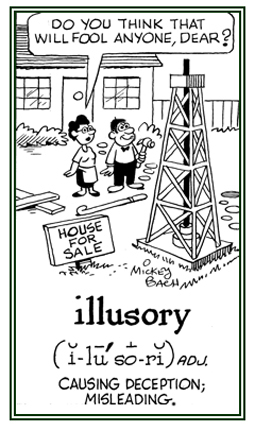
Go to this Word A Day Revisited Index
so you can see more of Mickey Bach's cartoons.
2. An interval in the performance of a play; the pause between the acts, or the means (dramatic or musical) employed to fill this pause: During the first interlude at the theater production, Terry started to talk with his friends.
The brief interlude during the long play featured comical characters juggling balls.
3. Etymology: from Middle Latin interludium, "an interlude"; from Latin inter-, "between" + ludus, "a play". Originally, farcical episodes introduced between acts of mystery plays.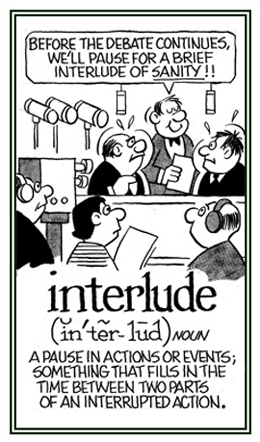
Go to this Word A Day Revisited Index
so you can see more of Mickey Bach's cartoons.
"Ludi Cercenses" (sur SEN seez) were games of the Circus; "ludic scenici" (SEN i sigh) of the theater.
Some were named for particular festivals: "ludi Apollinares" (uh pol" i NAY reez), in honor of Apollo, chiefly theatrical; "ludi Romani" (roh MAY nigh), in honor of Jupiter, in September; and "ludi Megalenses" (meg" uh LEN seez), in honor of the Magna Mater, April 4 to April 10.
After a hard day at the office, Michelle tried to think of the most ludic occupation she could to unwind and help her start to relax.
2. Of or pertaining to undirected and spontaneously frolicsome behavior: The young children on the playground often started to play imaginative and ludic games.2. Causing derisive or amusingly absurd or utterly ridiculous behavior which is unsuitable for a situation: When she was nervous or under stress, Lucinda often told the most ludicrous jokes.
3. Etymology: Ludicrous was borrowed from Latin ludicrus, from ludicrum, "joke, amusement", and from ludere, "to play".
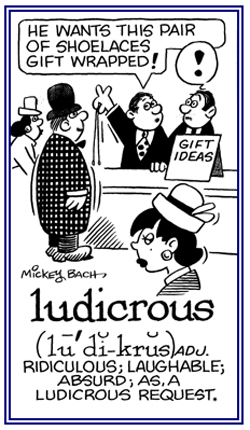
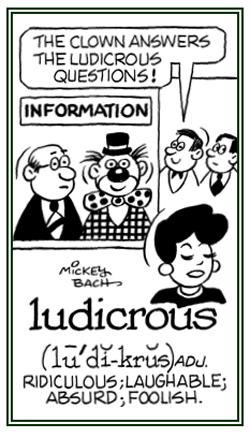
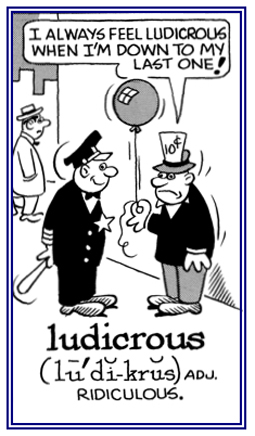
Go to this Word A Day Revisited Index
so you can see more of Mickey Bach's cartoons.
2. Completely devoid or lacking wisdom or good sense: When the company went bankrupt, the CEO was accused of ludicrousness.
2. Etymology: from ludus, the Latin word for "game", to refer to "the study of games and play activities".


